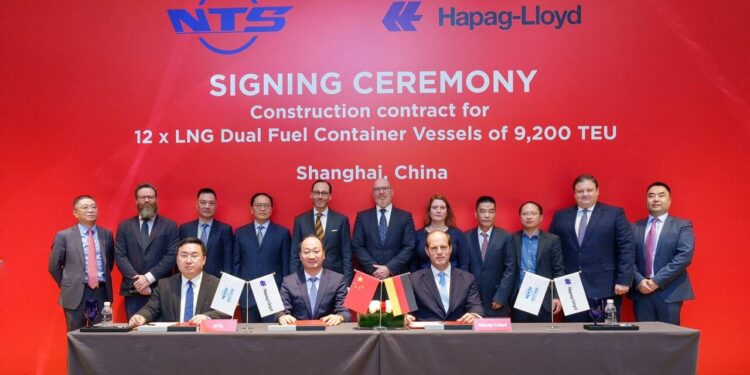A total of 24 new container ships have been ordered by Hapag-Lloyd from two Chinese shipyards. Yangzijiang Shipbuilding Group will construct 12 of these new structures, each with a 16,800 TEU capacity, these units will be used to increase the existing services’ capacity. Twelve more ships, each with a 9,200 TEU capacity, have been bought from New Times Shipbuilding Company Ltd. These two contracts have been signed to replace the Hapag-Lloyd fleet’s ageing vessels that will be reaching the end of their service lives this decade.
All of the new builds will use modern, highly fuel-efficient, low-emission, high-pressure liquefied petrol dual-fuel engines. As an alternative to traditional propulsion systems, biomethane can be used to operate these vessels, reducing CO2 emissions by up to 95%. The new ships will also be prepared for the use of ammonia-based fuels. These ships will be delivered to Hapag-Lloyd between 2027 and 2029 and will total about USD 4 billion in investment with a combined capacity of 312,000 TEU. Three billion dollars in long-term funding have already been agreed upon.
“This investment is one of the largest in the recent history of Hapag-Lloyd, and it represents a significant milestone for our company as it pursues the goals of its Strategy 2030, such as to grow while also modernising and decarbonising our fleet. Operating a fleet of more efficient vessels will also enhance our competitive position, and thanks to the increase in capacity, we will continue to offer our customers a global, high-quality product.”
Rolf Habben Jansen, CEO of Hapag-Lloyd AG.
Hapag-Lloyd has made a commitment to meet the Paris Agreement’s 1.5-degree objective. In an effort to achieve net-zero fleet operations by 2045, the company’s fleet operations are expected to cut its greenhouse gas emissions by around one-third by 2030 compared to 2022. In order to accomplish this ambitious aim, investments will be made in new, efficient structures, slow steaming, fleet modernisation, new propulsion technology, and alternative fuels. This will enable customers to take advantage of numerous green transportation options simultaneously. This investment is another step in Hapag-Lloyd’s efforts to be prepared for a multifuel future and to propel the decarbonisation of the liner shipping industry, especially in light of the recent investment decision announced on April 16 of this year to adapt five boats to methanol propulsion.
With a combined carrying capacity of 2.2 million TEU, Hapag-Lloyd owns and operates 287 modern container ships. As a result, the company is among the top liner shipping businesses in the world. Furthermore, it manages the biggest fleet flying the German flag.
If you are interested in meeting with global container and shipping businesses or are looking for new shipbuilding and supply companies, contact us today to learn about our MTB Marine events.

































